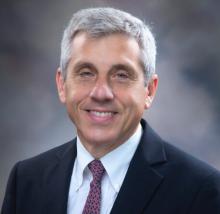- The professional and leadership development of a cardiothoracic surgeon requires skills that are neither typically taught in medical school nor organically developed through clinical practice.
- An executive coach can help surgeons improve performance, productivity, wellness, and resilience.
- Executive development is best done when supported by your department/institution, both financially and as a commitment to furthering your career.
Physicians undergo extensive technical training to develop the required expertise for the responsible care of patients. Cardiothoracic surgery training is narrow and deep and rarely addresses skills necessary for effective communication, the cultivation of self-awareness, listening, and what it takes to build high-performing teams. Dr. Frank Rosinia and Dr. Dawn Hui, both from UT Health, share their perspectives on why surgeons turn to executive coaching when they want to elevate their leadership skills and keep up with a constantly changing workplace.
Dr. Frank Rosinia: The Role of an Executive Coach

During my career, I had the opportunity to work as a senior executive in a large health system. Working as a full-time administrator was different than my career as a physician leader. There were “perks” provided to the senior executive team to improve human performance. Our executive team was provided with multiple avenues for professional development, which included leadership assessments, team-building exercises, and executive coaching. This was new to me and welcomed. Initially, I did not understand why someone would need an executive coach. This mindset changed. I came to understand that coaching is a partnership with a trained and certified individual who works on the client’s behalf to close the gap between potential and performance. OK, how does this work and how does it provide value?
The coach works with the client on their agenda in absolute confidence. This provides the client a place to open up and talk without fear of reprisal or discovery. The job of the executive coach is to help the client focus on the future and arrive at their own solutions through inquiry and challenging discussion, and at times offer advice. This is the foundational work of an executive coach. I am still amazed at the effectiveness of this simple approach. Over time this relationship leads to sustained change, improved effectiveness, and better-quality decision-making for the client. As an example, recent coaching work with a motivated vice president at a national healthcare company resulted in an off-cycle financial bonus for the client. She was one of 38 employees in a company of over 57,000 to be recognized. This is the result of strong teamwork between the coach and a motivated client.
What to Expect when Working with an Executive Coach
As physicians, we are practitioners in one of the most time-honored professions. We are all high-achieving elite professionals who covet our independence and autonomy. These traits can get us through medical school, residency, and fellowship, but are oftentimes in conflict with a healthcare system that is consolidating and requires a team-oriented approach to clinical care and thoughtful management.
An executive coach will support the professional development of physicians. This occurs when executive coaches act as sounding boards and assist in the creation of a developmental plan that directly addresses the complex issues facing their clients. The coach-client focus turns toward addressing behaviors, communication, decision-making, self-awareness, emotional intelligence, and many other dormant skills in physicians. In quoting Jeffrey R. Balser, MD, president and CEO, Vanderbilt University Medical Center, “We find that professional coaching plays an essential role in helping our leaders, both new and experienced, not only assimilate the shifting intellectual framework of shared governance, but also grow in emotional capacity and resilience to thrive in an ever-changing team-based environment.”
Common outcomes that result from a productive coach-client relationship include improved working relationships with direct reports, peers, and organizational supervisors. In addition, teamwork improves, job satisfaction increases, organizational retention strengthens, and productivity blossoms. Lots of really good stuff.
JAMA recently reported that after six months of professional coaching randomized among 88 physicians, benefits included decreased emotional exhaustion, decreased burnout, and improved quality of life and resilience. Coaches are not specifically trained in these areas, but the dynamic of a productive coach-client relationship is positive and powerful. This is why executive coaching is common in industries outside of healthcare.
Getting Started with an Executive Coach
If working with an executive coach to support your professional development seems to make sense, how do you get started? It is common for academic medical centers to contract with executive coaches who have gone through a request for proposal process. Check with your human resources department or the Dean’s Office for more information.
An internet search for executive coaches who work with physicians is also helpful. It is nice, but not necessary, to work with an executive coach who is also a physician or has worked significantly in healthcare. Finally, just start networking with friends and colleagues. It is becoming more common for health systems and academic medical centers to recognize the benefit of executive coaches. Some health systems have invested in internal coaches who are hired by the organization to serve their physicians and administrative leaders. If you are fortunate, a few select institutions have established programs that educate leaders in coaching practices. These leaders with coaching skills are better at listening, adaptive leadership, succession planning, conflict resolution, and team development. Once you have a short list of potential coaches, schedule interviews with them to find the right fit. A coaching contract typically runs for 12 months with hour-long discussions scheduled every 2 to 3 weeks.
Dr. Dawn Hui: What I Learned from an Executive Coach

In February 2021 I had the great fortune to be introduced to Dr. Frank Rosinia at the suggestion and support of my department chair. While Dr. Rosinia held the position of the Chair of Anesthesiology, he was introduced to me as a certified executive coach who offered coaching outside of his institutional role as Chair. Although I had been aware of him in his Chair role, I had had no interaction with him prior to this introduction and no established working relationship. I expected that we would develop a list of problems or goals that I wanted to overcome/achieve, and that we could map out a strategy or plan of accomplishment. Several physician friends who had worked with coaches reported only lukewarm to mild enthusiasm for their experiences, so my expectations for results fell in a similar range.
Working with Dr. Rosinia greatly exceeded, in scope and breadth, what I had imagined was possible. Much like my overall mindset, my initial expectations were narrow in range, linear in process, and rigid in structure. While the coaching sessions were somewhat structured in the beginning, including an intake form and a 360 evaluation, subsequent sessions were wide-ranging. Each was tailored to the progress I had made since the previous session and to the circumstances and challenges at the time. Through our coaching sessions supplemented by personal reflection, reading, and exercises, I began the process of further developing a more effective mindset, behaviors, communication, and presence. I developed a greater understanding of an organizational mindset for myself, and in dealings with others in leadership positions. My approach to and communication in professional relationships became more complex and fruitful. This personal growth helped me to evaluate and assess professional situations and challenges in a more professionally sophisticated and effective manner. I came to experience first-hand and thus believe in the value of dedicated time for physical fitness, self-reflection, and reading on development. Much like the operating room requires an environment of pure focus on the procedure at hand, personal growth and development require focused and dedicated time free of distractions.
Physicians can find mentors, sponsors, or unofficial sounding boards in the workplace, but it can be difficult to find a person who is both acquainted with the professional challenges you face, and unbiased by his or her own experiences or agenda. Furthermore, the lack of executive training in the medical school curriculum and generally in the medical field means that such skills are not routinely passed down. Medical training and practice are linear and hierarchical, often algorithmic, and rarely imaginative or creative. Recent trends in medical practice have only exacerbated the suppression of communication and creative thought: Examples include electronic medical record documentation practices, “best-practice alerts”, and a burgeoning use of artificial intelligence. As leadership opportunities expand, the challenges that arise require skills that counter this culture. Furthermore, extensive years of training at a single institution means that cardiothoracic surgeons in particular are often exposed to only a single workplace culture for up to a decade. More and more, physicians are expected to work with administrators in medicine who come from a uniquely different tradition of workplace culture, jargon, values, and communication. Effective physician leaders must learn to meet these colleagues in the middle, not only to understand and to consider their priorities and agendas, but to effectively communicate our own. Only then can transformative growth for institutions and patients become a possibility.
Dr. Rosinia’s familiarity, through his Anesthesia Chair role, with my institution’s mission, culture, leadership, and local challenges was a bonus. I didn't have to explain these from the beginning and instead, I could address challenges within that context, which he knew intimately. However, it is not necessary to work with a coach from your own institution. An executive coach, particularly one who has been a practicing physician, will offer the insights garnered from his or her own career experiences and interactions with the medical infrastructure, as well as those gained by working with other clients. This is also done with the benefit of the executive coaching method which has been developed and shown effective in several other industries. The personal and executive growth stimulated by coaching allows the physician to develop skills to conquer problems not only right now, but also anticipate and overcome those in the future.
Frank Rosinia MD, MHCM, ACC, is an executive coach, facilitator, and leadership consultant. He has over a decade of experience as an academic chairman, several years of C-Suite experience in a large complex health system, and success as the entrepreneur co-founder of an anesthesia management company. Dr. Rosinia specializes in executive coaching for physicians, and executive leadership in academic medical centers, health systems, and higher education through his coaching entity, Pascal Leadership (https://www.pascal-leadership.com).
References
- Horn, Elliott and Forbringer. Making a Case for Coaching. PEJ Nov-Dec 2010.
- Hicks and McCracken. Coaching Lions. PEJ May-June 2012.
- Thilo. More Coaches Needed to Advise Physician Executives. The Physician Executive, Nov-Dec 2004.
- Balser. The Case For Executive Coaching In Academic Medicine. Consulting Psychology Journal: Practice and Research 2019;Vol71,165.
- Dyrbye, Shanafelt, Gill, Satele and West. Effect of a Professional Coaching Intervention on the Well-being and Distress of Physicians. JAMA Int Med 2019;179:1406.
